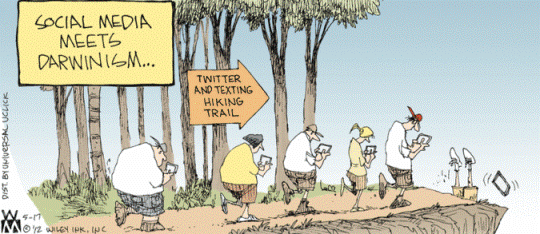The Essentials
All of my students must read these! |
| Hidden
Gems |
This NPR story
explains why "it doesn't matter where you go to
college, only what you do there." My students need to
read this because it puts the responsibility for
college success squarely where it belongs -- not on
the choice of schools, but on the work and attitude of
learners.
|
|
|
Detailed
discussion of how to read assignments, study for
exams, and locate on-campus resources for help. |
|
|
This page
details 40 things I expect of students. |
|
|
General
discussion of how to become a more effective writer
and detailed discussion of how to correct common
writing mistakes. Read the peeves section of
this page to avoid writing all your papers twice! |
|
|
This page
explains what I mean by "A," "B," and so on. |
|
|
How to find
or contact professor Hayes-Bohanan. When I was late to
a computer class once, students Asked Jeeves
where I was, and this page gave them a pretty good
idea! |
|
|
In this
page, I describe in detail some of what makes the
college experience qualitatively different from high
school. (Includes new material about the training of
professors.) |
|
|
Student face severe penalties for
plagiarism, often because they do not know what it is.
This site from Indiana University explains exactly how
to stay out of this kind of trouble. One related
problem that is NOT explained on the IU site is that
of a student submitting essentially the same paper to
fulfill requirements in two different courses. As a
student of mine once learned from unhappy experience,
this is only acceptable by prior arrangement with both
professors.
|
Campus Events
Extra Credit
|
Colleges present many opportunities to learn
outside of the classroom. Bridgewater State University
is increasingly committed to bringing a diversity of
lectures, plays, and other learning opportunities to
campus, presentations by nationally and
internationally known artists and scholars. Students
in my classes can earn extra credit by attending such
events and notifying me that they have done so, using
the form on this page.
|
|
Extra
Credit
|
When I began this web site, it was a single
page that I could maintain easily. Because of varied
interests, I have expanded the site to several hundred
pages and several thousands of links. In order to
maintain the accuracy of these pages, I encourage
students and other visitors to notify me of any
problems and to suggest any new items. Students who do
so may be eligible for extra credit. Non-students who
do so will earn my sincere gratitude!
|
Almost Essential
More ideas about college success and
education in general |
|
Foreign Language Study |

|
International
Programs
|
Studying abroad
is not a requirement at Bridgewater State University,
but it should be. As the world becomes ever-more
interconnected, those who study only in their own
comfort zone are not
really getting a complete education. At
Bridgewater, there is no excuse to do all of your
coursework in the United States.
The barriers to studying abroad are language learning,
family resistance, time, short-term job commitments,
fear. I have helped students overcome each of these
obstacles, and I have had the honor of being with
abroad with students in Mexico, Cuba, Nicaragua, Cape
Verde, and Brazil. See my international page
for stories and photos. My BSC colleagues
have taken or sent students to Japan, China, India,
Morocco, Italy, Peru, Jordan, and many other
locations.
Planning ahead
can help to overcome many of the obstacles: take foreign language
courses as soon and as often as you can, and look into
financial aid, loans, and grants. Get to know
international students and local students who have
been abroad. Have a meal at an ethnic restaurant. Try
asking Grandma for $50 toward a trip instead of
another sweater for your birthday.
|
| Geography |
 is a great way to learn about the
world and it is excellent preparation for general
business, public service, and teaching as well as
specialized work in the environment, planning, or a
host of other fields. is a great way to learn about the
world and it is excellent preparation for general
business, public service, and teaching as well as
specialized work in the environment, planning, or a
host of other fields.
|
|
|
Simple-living guru Pamela Hayes-Bohanan, has
prepared a simple guide to success in college. I
highly recommend it!
|
|
In
an
anti-intellectual
age,
standardized testing increases, in the guise of
"accountability." High-stakes tests are known to
perpetuate discrimination. More importantly,
high-stakes testing skews curricula as frightened
educators cave in to political pressures and "teach to
the test." This harms both K-12 and higher education,
but the mis-named No Child Left Behind Act ensures
that the damage will continue, at least until sensible
people get organized!
The National Center for Fair & Open Testing
(FairTest) works to end the misuses and flaws of
standardized testing and to ensure that evaluation of
students, teachers and schools is fair, open, valid
and educationally beneficial.
|
| The
'copters |
This article
from the Washington
Post helps faculty members, students, and
parents understand a new cultural collision: that
among millenium-generation students, their parents,
and college faculty members. Parents who think they
are "just helping" combine with students who are used
to being "taken care of" and bump up against a very
different culture in higher education, in which
professors expect students to be much more
independent.
The article refers to a meeting
in Phoenix that I happened to attend! I have tried to
incorporate those lessons in my teaching and advising,
the mentoring of my peers, and -- most especially --
my parenting. After all, I don't want some professor
calling me a "helicopter parent" ten years from now!
|
|
|
 The subtitle of
this engaging book is 40 Schools You Should Know
About Even If You're Not a Straight-A Student. Author
Loren Pope describes innovative approaches to higher
education that are as varied as they are successful.
This is the best book I know of for exploring the
purposes of a liberal-arts education. Students,
faculty, and administrators in any institution will be
challenged by the ideas presented here. The subtitle of
this engaging book is 40 Schools You Should Know
About Even If You're Not a Straight-A Student. Author
Loren Pope describes innovative approaches to higher
education that are as varied as they are successful.
This is the best book I know of for exploring the
purposes of a liberal-arts education. Students,
faculty, and administrators in any institution will be
challenged by the ideas presented here. |
| Costly
Cars
|
Writing for
Cars.com, Renee Krejci advises students of the costs
and hassles of keeping cars on campus. Of course cars
are needed by some students, but it is also easy for
students to get caught in a cycle of working to
support a car, rather than having a car to support
their work. It is worth doing some careful calculation
to see if a campus-bound lifestyle is more practical.
I recall that during my freshman year, I spent two
months without going more than a mile from my dorm --
for work, school, parties, everything. College
campuses have a lot to offer, and although finding a
job on campus might be difficult, without a car to
support, a student might be able to
|
|
Dr. Mom |
What would
your mom tell you as you went off to college, if your
mom were a college professor. Visit Dr. Mom's Guide to
College to find out. A biology professor has created
this site, building on the advice she gave her own
daughter when it was that time in her life. She
confirms much of what I offer on this site, and adds
many things I had not thought of. Please have a look! |
|
|
On this page, I draw on an oft-repeated
joke about higher education to make some serious
points about the value of a liberal-arts degree.
|
FinAid
|
Media thrive on sensational stories, and one
of the most common is the story about skyrocketing
college costs. The result of irresponsible reporting
on this subject is that most families overestimate
the cost of college, perhaps giving up on the idea
even though help could have been available. The FinAid
site explains financial aid programs and provides
online calculators to estimate costs and available
aid. Of course, it is also important to contact the
financial aid offices of colleges in which you
are interested. They often have campus-specific
sources of aid!
|
|
|
The Environmental & Resource Studies
Program at Trent University in Canada has prepared
this fantastic set of resources for its students. It
goes far beyond my Not-the-13th-Grade site to provide
specific guidance that can make students in any
discipline more effective learners. If you are paying
tens of thousands of dollars on learning, it is a good
idea to do so as effectively as possible. This site
could change your life! |
|
|
Almost
every human civilization has figured out how to
ferment something pretty soon after figuring out how
to eat. In other words, alcohol is part of most human
cultures. Norms and laws about its use vary widely,
even within a single society. Unfortunately, a lot of
confusion, lawlessness, stupidity and even death
surround alcohol use in college settings. I created
this page after a former student of mine was killed by
a drunk fellow student, and I updated it when more
than 100 college presidents endorsed the idea of
renewed debate on this important topic.
We need to get
serious about this problem.
|
| Non-traditional
Students |
In my experience,
students who return to college a few years -- or
decades -- after the traditional 18-22 age bracket
have a lot to gain from college and a lot to offer in
and out of the classroom. This Pagewise document
provides some help for those entering this sometimes
scary realm.
|
Idealist
|
Expand your possibilities by learning more
about the world around you and beyond. This site will
soon have a special portal for college students.
Meanwhile, the main site is an excellent way for
students to find out about organizations that share
their vision for change. This is also a great place to
explore careers in the area of social or environmental
activism.
|
|
|
Satirical
guide to college success, posted by my colleague Prof.
Robert Sutherland. |
|
|
Everything
and nothing. If you miss class and ask this question,
consider Tom Wayman's poem the answer.
PLEASE NOTE: Some
version of this poem circulates among faculty
throughout the country. I am posting it here so that
students can have an idea what professors are thinking
when we hear this question. |
No
Sympathy
|
Professor Steve
Dutch's page goes beyond Tom Wayman's single question,
to answer a range of questions professors hear far too
often. If answers like these seem harsh, it is time
for the student to think more seriously about the
reasons they are in college. It turns out that most
professors share Assumption #4 on my Assumptions page
(listed above).
|
|
|
To be fair,
this page details what I expect of myself! My
colleague Ted Fischer of Vanderbilt University once
told an audience of international educators, "Society
pays us to make a difference." College professors are
paid moderately well and enjoy the ability to spend a
lifetime in the world of ideas, paid for by society as
a whole through a combination of tuition, fees, taxes,
and foundation money. Fischer argued that society does
not do this for US. Rather, society does this in
exchange for what we do in the lives of other people.
|
|
|
For those
intending to have a professional life after college,
the standards and expectations in Dr. Vernon Domingo's
senior seminar are a valuable reality check. (Dr.
Sandra Clark has emphasized the same themes in her
offering of the seminar in 2002!) Picture yourself in
just a few months or years in a professional setting,
and the standards he has set will make a lot of sense. |
|
|
Guidelines
for rating language and math skills from the U.S.
Department of Labor. |
|
|
This page
presents some of Edward Tufte's ideas for giving
excellent presentations. This is useful advice for
professors, other professionals, and students who need
to give presentations. |
|
|
I want
students to know that I know what it is like to work
through college (ask around: most of your other
professors worked through school, too!) I therefore
prepared this unofficial resume, which includes all of
the jobs I can remember having. |
|
|
From Ann
Landers comes this list of ten rules of life that are
not taught in school.
|
|
|
 Actess
Danica McKellar has two messages for girls (and
women): You can
do math, and smart is sexy! Actess
Danica McKellar has two messages for girls (and
women): You can
do math, and smart is sexy!
We bought her second book for our daughter, to
help counteract all the stupid messages our
culture sends about smart girls (and women). She
loves the book!
You can listen to McKellar's interview with Scott
Simon on NPR's Weekend Edition
Saturday. (This link provides links
to additional NPR stories on math and learning.)
You can also learn more at her web site
or buy her books: Math Doesn't Suck
and Kiss My Math:
Showing Pre-Algebra Who's Boss. The
Amazon link for the second book includes video in
which McKellar explains how she came to write the
books.
|
|
|
This
article considers the purposes of higher education in
an age of increasing pressure to provide vocational
training in the academy. |
|
|
Beloit
College in Wisconsin releases an annual list of
cultural touchstones that differentiate freshmen/women
from older people, such as professors. I recommend
this list both to professors -- so they can know what
NOT to assume about their younger students -- and to
students -- so they can know what kinds of things
professors may taking for granted if they have not
read the list. If you think of New Kids on the Block
as new, you need this list! |
|
|
Educating yourself may be a subversive act. In
his essay "School Bells," Lewis H. Lapham argues that
mainstream politicians pay only lipservice to
improving education. |
|
|
Read what
one experienced educator has to say on the pros and
cons of using computers in higher education. |
|
|
From "keep
an open mind" to "you can't know everything" to "don't
follow the crowd, lead the crowd," journalist Leonard
Boasberg offers a lot of wisdom about learning in a
three-minute essay he presented on Morning Edition, March
25, 2002 . |
|
|
One of the goals of higher education is to
make better citizens. This is particularly true for
students in the U.S., who are citizens of the world's
only superpower, but are not generally taught to think
of themselves in such terms. I created the Pax Mundo
site to help U.S. citizens understand how we are
perceived by those in the rest of the world.
|
|
|
Eighty-eight
tips on how you can take advantage of all that college
has to offer. |




 The subtitle of
this engaging book is 40 Schools You Should Know
About Even If You're Not a Straight-A Student. Author
Loren Pope describes innovative approaches to higher
education that are as varied as they are successful.
This is the best book I know of for exploring the
purposes of a liberal-arts education. Students,
faculty, and administrators in any institution will be
challenged by the ideas presented here.
The subtitle of
this engaging book is 40 Schools You Should Know
About Even If You're Not a Straight-A Student. Author
Loren Pope describes innovative approaches to higher
education that are as varied as they are successful.
This is the best book I know of for exploring the
purposes of a liberal-arts education. Students,
faculty, and administrators in any institution will be
challenged by the ideas presented here.